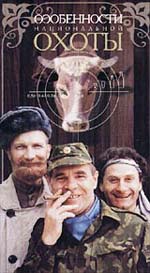Peculiarities of the National Hunt
You can help expand this article with text translated from the corresponding article in Russian. (March 2009) Click [show] for important translation instructions.
|
| Peculiarities of the National Hunt | |
|---|---|
 VHS cover | |
| Directed by | Aleksandr Rogozhkin |
| Written by | Aleksandr Rogozhkin |
| Produced by | Aleksandr Golutva |
| Starring | Aleksei Buldakov Viktor Bychkov Sergey Gusinsky Semen Strugachev Sergey Russkin Sergey Kupryanov Ville Haapasalo |
| Cinematography | Andrei Zhegalov |
| Edited by | Tamara Denisova |
| Music by | Vladimir Panchenko |
| Distributed by | Lenfilm |
Release date |
|
Running time | 94 minutes |
| Country | Russia |
| Languages | Russian, English, Finnish, German |
Peculiarities of the National Hunt (Russian: Особенности национальной охоты, [Osobennosti natsionalnoy okhoty] Error: {{Lang}}: text has italic markup (help)) is the first and most notable "Russian national comedy". As soon as it was released in 1995 it became a nationwide success in Russia, the leader at the Russian box office. It won the Nika Award and Kinotavr awards. It was followed by several other "Peculiarities..." films.
Synopsis
A young Finn, Raivo (Ville Haapasalo), studying Russian manners and traditions, convinces his friend Женя [Eugene] (Сергей Куприянов) to help him participate in a real hunt in order to better familiarize himself with its peculiarities. They band together with a company led by an ex-army general (Alexey Buldakov) and set off to a distant cordon in the woods, taking with them several cases of vodka.
Waiting for them at the cordon is an eccentric huntsman, Kuzmich (Viktor Bychkov), who occupies himself with meditation and Japanese culture, and some big-city types from St. Petersburg.
Instead of the expected hunt, Raivo (Райво) finds himself encountering rampant drinking and adventures. The plot can be divided into several vignettes – an incident with a bear in a sauna, the fireworks, the story of the rural policeman who lost his pistol, the scene on the farm, the story about the cow being transported in the weapons bay in a modern bomber (Tupolev Tu-22M) in exchange for a bottle of vodka, the drive in a "borrowed" police car UAZ to get to know some local milkmaids, etc.
In the whirlwind of drinking and good times, the hunt itself takes a secondary or even tertiary position.
The second plot line are the Finn’s daydreams of a real hunt based on his impressions from classic Russian literature. Short episodes from the pre-revolutionary period periodically appear throughout the film as inserts woven into the primary storyline. “Historical” hunting differs greatly form the modern version. The participants of the traditional hunt, unlike their would-be hunter contemporaries, enjoy conversation in French, flirting with women and constant treats without forgetting what’s important – tracking a large wolf.
The contrasting story lines of the foolish contemporary fumbling and the circumspect traditional entertainment intersect in the finale. Raivo's surreal experience is highlighted by several peculiar incidents. e.g. Kuzmich picking a pineapple from the hedgerow, Earth being visible in the night sky etc.
A notable feature of the film is the range of different languages which are spoken by the characters throughout: Russian, English, Finnish, German & French.
Cast
- Ville Haapasalo as Finn Raivo Haapasalo
- Alexey Buldakov as General Ivolgin(Mikhalych)
- Viktor Bychkov as forester Kuzmich
- Semen Strugachev as Lev Soloveichik
- Sergei Kupriyanov as Eugene Katchalov (voiced Boris Birman)
- Sergey Ruskin as Sergey O. Savenko
- Sergei Gusinsky as Sgt Semenov (voiced Alexander Polovtsiev)
- Igor Sergeyev as Earl
- Igor Dobryakov as noble
- Yuri Makusinsky as second huntsman
- Boris Cherdyntsev as airport commandant Maj. Cherdyntsev
- Alexander Zav'yalov as ensign
